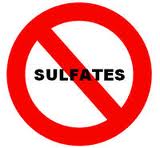 Ok, so why do people think sulfates are bad? Why is there this sudden rise in sulfate-free shampoos and conditioners? Are we all going to die from shampooing with sulfates?! No! We won't die. Honestly, there's nothing wrong with sulfates, it's just one of those crazes that has swept the nation and beauty companies see there's money to be made in a sulfate-free line of products, so they jumped on the band wagon.
All the organic-y people out there (before I get hate mail, I clearly realize not every person into organic products thinks this, I am being dramatic) think that chemicals are bad and the less chemicals the better, because everything from the earth is healthy and safe, right?! We know that's not true because arsenic is natural... anyways, some people out there like to use as few chemicals as possible because they think that makes them healthier. I also remember reading articles from years ago that sulfates make hair fall out. Since there are no medical studies to back any of this up, I don't see a reason why I should swap my lathering, cleansing shampoo for one that doesn't clean my hair as well. Also, every ingredient that's used in cosmetics has to be FDA approved. Let's have a little faith in our government, shall we?
I have used sulfate-free shampoos and I hate them. I can go several days between shampoos and after I used a sulfate-free shampoo, the next day my hair looked filthy. This was because it didn't clean my hair as well. According to the Beauty Brains, sulfates are the best way to get silicone (one of the ingredients in conditioners, shine sprays and serums that makes hair soft, shiny and untangled) off the hair . Almost everyone out there has some amount of silicone on their hair right now and if you aren't properly washing it off, it will build up over time. I think sulfate-free shampoos are not nearly as effective as regular ones.
Now, with that being said, there are some people out there who have very sensitive scalps and sulfates may be irritating them. Those people will probably benefit from using a sulfate-free shampoo. But by no means are people going to die and experience hair loss from a sulfate-based product. Give me my sulfates!
Do any of you kittens have a story you'd like to share about sulfate-free products? Do you like them? What made you try them? Leave a comment :) Meow.
Image: Google Images
References: www.LiveStrong.com
www.HuffingtonPost.com
www.TheBeautyBrains.com
I'm sure many of you, when you were little, were told by your mom that if you wax your body hair off, it will grow back thicker and blacker. Am I right? Well, good news: that's not true! In fact, over time the hair follicles may get damaged and be able to only produce wispier, thinner hair. And it will never come back darker. Nothing from the environment can change the predetermined melanin in your hair. The reason hair seems to grow back darker is because, let's take arm hair for example, the hair on your arms has been exposed to the sun over the course of its' life and has been lightened by it. So when you take all of that hair out at once and lots of it starts popping back up at once, it's going to appear darker because it hasn't had a chance to be lightened by the sun yet. You don't notice this happening when it's only a few hairs at a time that are falling out naturally and growing back out.
Now, let's talk about shaving for a bit. My friends and I always laugh about how our parents would scare us after popping out of the shower when we were like eight and they found out we attempted to shave our legs. "Oh no! Now you're going to have coarse, dark hair grow back! Oh! You're going to look like a monkey!" And they scared us into thinking that our rash decision to pick up mom's razor would result in us looking like King Kong in a few days. Well, again, this isn't true. It seems true because when you cut a hair off right at the skin, it gets cut off bluntly (see picture below). When hair falls out naturally or gets pulled out (either by tweezing or waxing) it grows back out to a point, making it look thinner in diameter than it really is. And, like I said earlier, that leg hair had been lightened by the sun and none of this new hair that's going to grow out will have ever seen the light of day before, so it's going to be darker than the hair color you're used to seeing which also contributes to it looking thicker.
How many of you got scolded for shaving your legs when you were little? Or told that waxing was a devilish activity? Leave a comment! 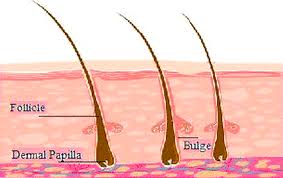 See how at the tip of the hair strand it's grown to a point and how that's thinner than the part of the strand that's right at the skin? This is why shaving makes hair appear thicker/coarser when it grows back.
Images: Google Images
References: www.HairFoundation.org
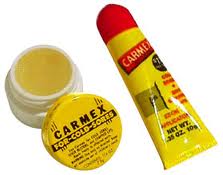 So I was at school the other day and a conversation about Carmex got brought up. When I told my friend that I used it every night she about fell off her chair stating that she was told that "Carmex is like taking an eraser across tissue paper"...what?! I found out that a lot of people have heard that it's horrible for your lips and that there's a "really bad ingredient in it". So, naturally I researched this little myth because I found this very hard to believe.
In my research, I found that people think there's ground glass in it or that there's an "addicting" ingredient. Snopes found these claims to be false and if you look at the ingredient list, there's nothing that's not FDA approved. And I highly doubt there's something in it that's not listed because the company would have been in trouble a long time ago.
However, according to The Beauty Brains, there is some truth to becoming addicted to lip balm. Not in the same sense that someone gets addicted to crack, but you can, in a sense, train your body to rely on lip balm. Your lips (and every part of your skin) has a top layer that sloughs off dead skin cells and as it does this, it tells the deeper layers of skin to send up some new cells. Well, when you have lip balm on, those deeper layers of skin don't get those signals to produce new cells anymore because the lip balm is preventing the sloughing of dead cells, so it quits. Once you quit using lip balm for a while, your body will see that it needs to quit being lazy and start bringing up new cells again. So, there's nothing to worry about- no need to join a support group or anything :)
Here's a list of the ingredients and what they do:
Camphor- Analgesic (Relief from pain)
Menthol- Anti-Itch (That's what the product says but when I look that ingredient up it says it's used in cosmetics as an anesthetic.)
Phenol- Anesthetic (I found that it's approved to be used as an antiseptic and analgesic. I couldn't find that it's used in OTC products for an anesthetic, but that's what the back of my product says...)
Beeswax- Keeps the emulsion from separating
Cetyl Esters- Wax lubricant
Flavor
Fragrance
Lanolin- Moisturizer
Mineral Oil- Skin protectant/ skin conditioning agent
Petroleum- Dissolves other substances
Salicylic Acid- Approved for use as a denaturant, exfoliant, preservative and a skin conditioner. Since it's pretty low on the list, I'm assuming it's used as a preservative in this product.
Cocoa Seed Butter- Skin protectant
See? Nothing to be afraid of, kittens. It's my favorite lip-moisturizing product and I fearlessly use it every night! Do you use Carmex? Tell me why you love it and which product you use :)
Image: Google Images
References: www.Snopes.com
www.TheBeautyBrains.com
"Can You Get Hooked on Lip Balm?"
www.CosmeticsInfo.org
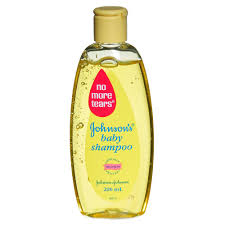 Old Myth Busted: There are not numbing agents in J&J Baby Shampoo! I had heard this and thought it sounded strange so I investigated. The belief as to how this myth started, according to The Beauty Brains, was because of an ingredient, "benzyl alcohol", that is believed to have been used as a preservative. It's not used in J&J Baby Shampoo anymore though. The reason this shampoo doesn't make babies cry is because of the size of micelles (these are electrically charged particles formed by accumulations of molecules). Smaller micelles can penetrate the eye and irritate it, where as larger ones, like in baby shampoo, can't penetrate and therefore don't irritate eyes. Salt content, pH and impurities are all important factors in making things tear-free as well. Image: Google Images References: The Beauty Brains
 Beauty Fact: The other day I heard that fish scales were in lipstick. What?! I had never heard this before so I researched it and it's true! "Guanine" is the ingredient in cosmetics (not just lipstick) that is made from fish scales and related to guano, bird poo. It's technically a colorant but it's good at covering up blemishes and makes products more opaque. How interesting! Does this make anyone grossed out? Leave a comment and let me know!
Image: Google Images
References: www.thebeautybrains.com
www.cosmeticsinfo.org
So this old wive's tale got brought up today and I thought I'd set the record straight: pulling a gray hair out will NOT make more gray hairs grow! The hair follicle only has room for one hair. Ehow.com brought up a very valid point: if this were true, don't you think people who were balding would just sit around plucking the hairs that were left to produce more hair and never go bald? Going gray is usually determined by your genes. However, there other things that can contribute to when you start going gray: anemia, thyroid issues and smoking to name a few. But plucking them will not make matters worse, so don't hesitate to pluck a gray hair!
Image: Google Images
References: www.Ehow.com
www.WiseGeek.org
|

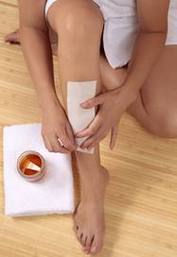
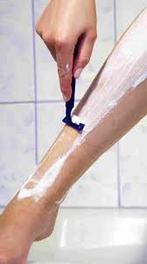




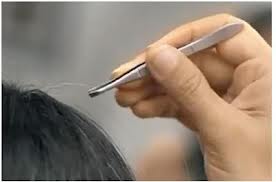
 RSS Feed
RSS Feed